课件2021-2022学年人教版七年级英语下册Unit 4 SectionA GrammarFocus-3c (不含听力)
文档属性
| 名称 | 课件2021-2022学年人教版七年级英语下册Unit 4 SectionA GrammarFocus-3c (不含听力) |

|
|
| 格式 | zip | ||
| 文件大小 | 2.2MB | ||
| 资源类型 | 教案 | ||
| 版本资源 | 人教新目标(Go for it)版 | ||
| 科目 | 英语 | ||
| 更新时间 | 2022-03-30 00:00:00 | ||
图片预览

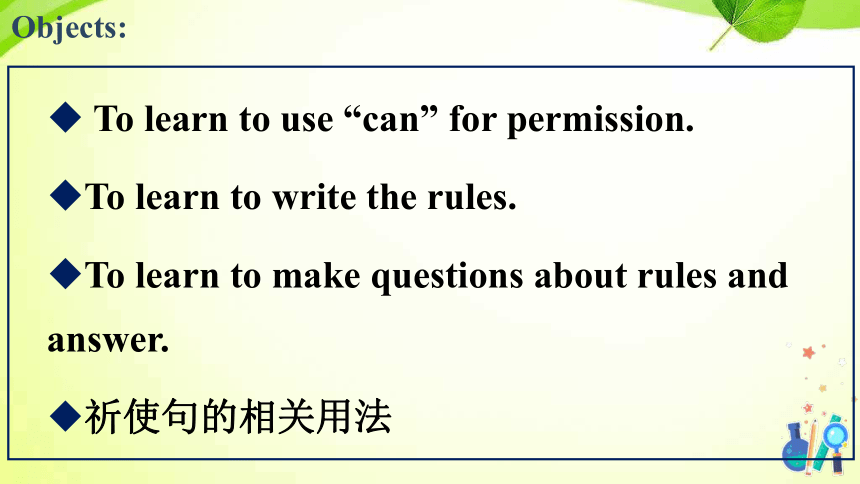

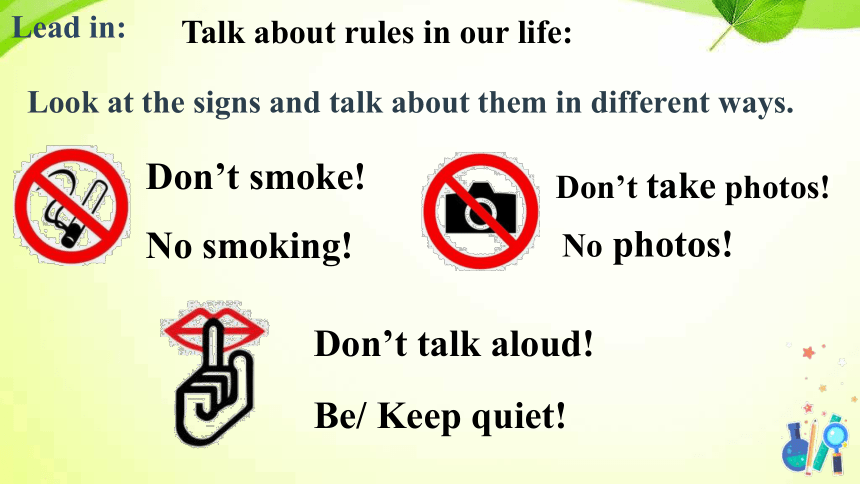
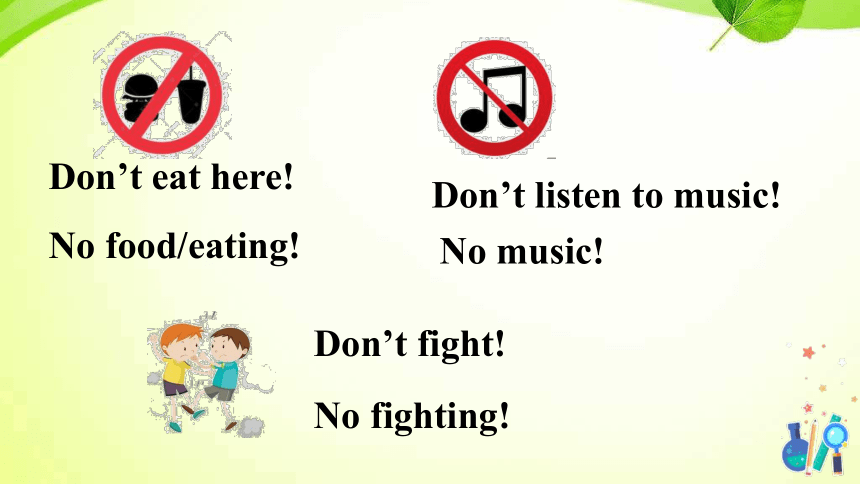
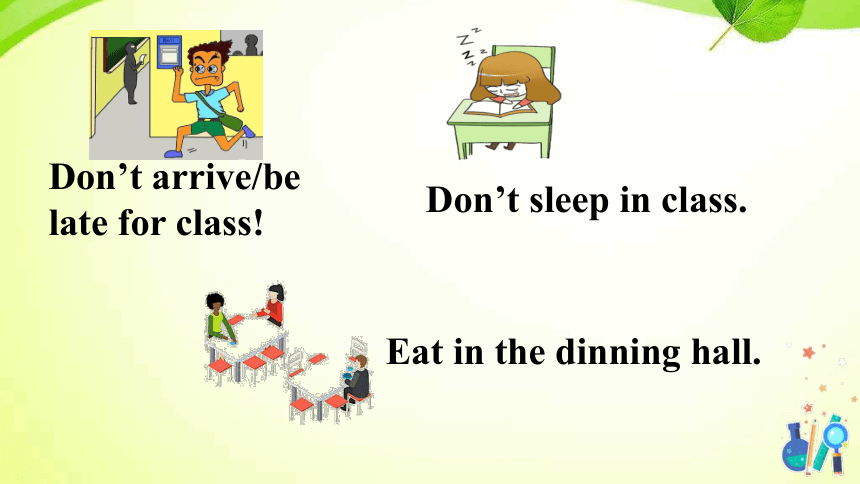
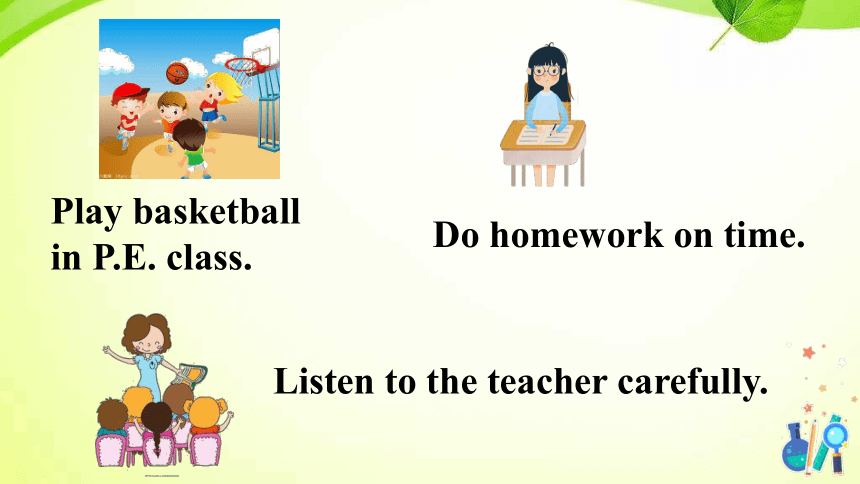
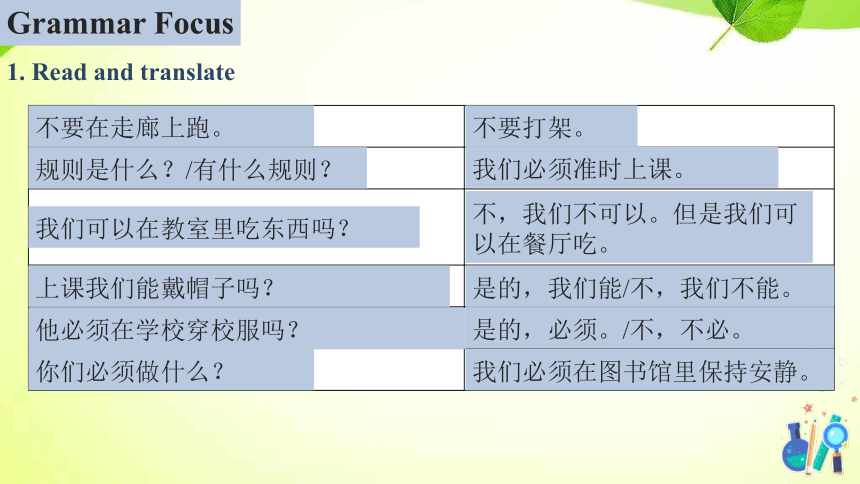

文档简介
(共24张PPT)
Unit 4 Don’t eat in class.
Section A Grammar Focus-3c
To learn to use “can” for permission.
To learn to write the rules.
To learn to make questions about rules and answer.
祈使句的相关用法
Objects:
We can’t fight
Don’t fight
We can’t talk in class
Don’t talk in class
We can’t sleep in class
Don’t sleep in class.
If you are a teacher, what do you want to say….
(如果你是老师,你想要对他们说…….)
Don’t smoke!
No smoking!
Talk about rules in our life:
Look at the signs and talk about them in different ways.
Lead in:
Don’t talk aloud!
Be/ Keep quiet!
Don’t take photos!
No photos!
Don’t eat here!
No food/eating!
Don’t fight!
No fighting!
Don’t listen to music!
No music!
Don’t arrive/be late for class!
Eat in the dinning hall.
Don’t sleep in class.
Play basketball in P.E. class.
Listen to the teacher carefully.
Do homework on time.
Grammar Focus
Don’t run in the hallways. Don’t fight.
What are the rules We must be on time for class.
Can we eat in the classroom No, we can’t, but we can eat in
the dining hall.
Can we wear a hat in class Yes, we can./No, we can’t.
Does he have to wear a uniform at school Yes, he does./No, he doesn’t.
What do you have to do We have to be quiet in the library.
1. Read and translate
不要在走廊上跑。
不要打架。
不,我们不可以。但是我们可以在餐厅吃。
是的,我们能/不,我们不能。
我们必须准时上课。
我们可以在教室里吃东西吗?
上课我们能戴帽子吗?
他必须在学校穿校服吗?
你们必须做什么?
我们必须在图书馆里保持安静。
规则是什么?/有什么规则?
是的,必须。/不,不必。
祈使句的否定句怎样构成?肯定句呢?一般在什么情况下会用祈使句?
情态动词在用法上有什么共同点?
can在本单元主要表示什么含义?它还可表达什么意思?
have to在句法上与其他情态动词有何区别?
2.Cooperation inquiry.
Grammar Focus
Imperative Sentences祈使句
定义:
祈使句一般用来表示请求、命令、劝说、警告、禁止等。在祈使句中,一般以动词原形开头,通常省略句子的主语you。
Be quiet, please. 请安静。
Go and wash your hands. 去洗你的手。
Be kind to your sisters. 对姐妹要和善。
Look out! Danger! 小心! 危险!
Keep off the grass. 勿践踏草坪。
请求
命令
劝说
警告
禁止
_________
_________
_________
_________
_________
Don’t引导的否定祈使句
Don’t+动词原形+其他.
Don’t be+其他.
Grammar
例句:1. Don’t arrive late for class.
2. Don’t fight.
3. Don’t be rude.
4. Don’t be careless.
2. 句式结构:
肯定祈使句
(1) V型祈使句: __________________ + 其他.
Practice the guitar every day.
(2) Be型祈使句: ______ + ______ + 其他.
Be quiet!
(3) Let型祈使句: ______ + ______ + ________ + 其他.
Let me help you.
否定祈使句
(4) Don't型祈使句: ______ + ________ + 其他.
Don't eat in the classroom.
(5) No型祈使句: ______ + ________ + 形式。
No Parking.
注意:V型和B型祈使句有时在句子里加 please来缓和语气。
V(行为动词的原形)
Be
形容词
Let
sb.
动词原形
Don't
动词原形
No
动词-ing
情态动词must的用法
must表示“必须”。
Grammar
例句:
1. Don’t arrive late for class. We must be on time.
上课别迟到,我们必须准时。
2. You must read a book before you watch TV.
看电视前必须先读书。
情态动词can表“许可”的用法
can表示许可,意为“可以”。can的否定形式为can not,可缩写为can’t。
Grammar
例句:
1. You can play basketball on weekends.
你可以在周末打篮球。
2. We can’t run in the hallways.
我们不可以在走廊里跑。
2.Cooperation inquiry.
Grammar Focus
must (情态动词) have to (动词短语)
含义 “必须、一定”,表示因主观需要或责任感的驱使而有必要或义务去做某事;也可表示命令、愿望 must +动词原形 I must go now. “不得不;必须”,强调客观因素影响而不得不做某事,跟主观意愿无关
have to +动词原形
It’s too late. I have to take a taxi.
时态 一般只表现在,无人称和数的变化 例: I/He/We must work. 可用于不同时态,有人称和数的变化(have to→has to) He has to wear a jacket.
否定 “mustn’t ” 不准、禁止 You mustn’t swim in the river. 借助助动词do/ does
“don’t/doesn’t have to” 不必、不需要
You don’t have to get up early.
疑问 以must开头的一般疑问句, 肯定回答:用must 否定回答:用needn’t/ don’t have to (不需要,不必) 例: - Must I go now - Yes, you must. - No, you needn’t.(No,you don’t have to. ) 借助助动词do/ does
肯定句:I have to go home.
一般疑问句:Do you have to go home Yes,I do. No,I don’t.
太晚了,我必须乘出租车。
我必须现在就走。
你不需要早起。
你们不准在河里游泳。
他不得不穿一件夹克衫。
Library Rules
Don’t talk. /No talking.
________________
________________
________________
3a Write the rules for the school library.
Don’t listen to music./ No music.
Don’t eat or drink./ No food.
Don’t take photos. / No photos.
3b Practice
Use the words to make questions about the rules. Then write answers according to your school.
Be quiet (she/have to /in the library)
Q: Does she have to be quiet in the library
A: Yes, she does.
2. Eat (he/have to/in the dining hall)
Q:_________________________________________
A:_________________________________________
Does he have to eat in the dining hall
Yes, he does.
3. Listen to music (we/can/in the hallways)
Q: ________________________________
A: ________________________________
4. Wear a hat (we/can/in the classroom)
Q: ________________________________
A: ________________________________
Can we listen to music in the hallways
No, we can’t.
Can we wear a hat in the classroom
Yes, we can. / No, we can’t.
3b Practice
1. We can eat in class.
2. We don’t have to come to school every day.
3. …
Make up five cool rules for your dream school. Share your rules with the class. Your classmates vote for the Coolest School!
3c Discussion
At my dream school, we don’t have to come to school every day. We …
Summary
1. 祈使句的用法和结构
2. must 和 have to 的比较
3. can 的用法和句型结构
句型转换:
1. You can’t take photos in our library. (改为祈使句)
______________ ______________ photos in our library.
2. She has to walk to work every morning. (改为一般疑问)
__________she _________ to walk to work every morning
3. At my home I must do my homework first. (改为同义句)
At home I ___________ ________do my homework first.
4. Do your homework carefully. (改为否定句)
_______________ ____________your homework carefully.
5. Don’t eat in class, John. (改为同义句)
____________ ______________________in class, John.
Don’t
take
Does
have
have
to
Don’t
do
No
eating
Exercises:
用所给单词的适当形式填空:
1. _______ _________(not listen) to music in bed.
2. Do you have to ________(clean) the room every day
3. You can’t ________(wear) a hat in class.
4. Please ________(arrive) at school on time (准时).
5. John ____ (be) never late for class in the morning.
is
listen
clean
wear
arrive
Don’t
6. Does he ______(have) to be on time
7. We have to ____(be) quiet in the library.
8. You must ______(eat) in the dining room.
9. What do you have to ____(do)
10. She __________(not) have to wear a uniform.
have
be
eat
do
doesn’t
用have to的适当形式填空:
1.We clean our classroom after school.
2.She make breakfast before going to school.
3.It’s late. My mother make dinner for us.
4.Emily and Peter live in China now. They ___________ learn to speak Chinese every day.
have to
have to
has to
has to
Unit 4 Don’t eat in class.
Section A Grammar Focus-3c
To learn to use “can” for permission.
To learn to write the rules.
To learn to make questions about rules and answer.
祈使句的相关用法
Objects:
We can’t fight
Don’t fight
We can’t talk in class
Don’t talk in class
We can’t sleep in class
Don’t sleep in class.
If you are a teacher, what do you want to say….
(如果你是老师,你想要对他们说…….)
Don’t smoke!
No smoking!
Talk about rules in our life:
Look at the signs and talk about them in different ways.
Lead in:
Don’t talk aloud!
Be/ Keep quiet!
Don’t take photos!
No photos!
Don’t eat here!
No food/eating!
Don’t fight!
No fighting!
Don’t listen to music!
No music!
Don’t arrive/be late for class!
Eat in the dinning hall.
Don’t sleep in class.
Play basketball in P.E. class.
Listen to the teacher carefully.
Do homework on time.
Grammar Focus
Don’t run in the hallways. Don’t fight.
What are the rules We must be on time for class.
Can we eat in the classroom No, we can’t, but we can eat in
the dining hall.
Can we wear a hat in class Yes, we can./No, we can’t.
Does he have to wear a uniform at school Yes, he does./No, he doesn’t.
What do you have to do We have to be quiet in the library.
1. Read and translate
不要在走廊上跑。
不要打架。
不,我们不可以。但是我们可以在餐厅吃。
是的,我们能/不,我们不能。
我们必须准时上课。
我们可以在教室里吃东西吗?
上课我们能戴帽子吗?
他必须在学校穿校服吗?
你们必须做什么?
我们必须在图书馆里保持安静。
规则是什么?/有什么规则?
是的,必须。/不,不必。
祈使句的否定句怎样构成?肯定句呢?一般在什么情况下会用祈使句?
情态动词在用法上有什么共同点?
can在本单元主要表示什么含义?它还可表达什么意思?
have to在句法上与其他情态动词有何区别?
2.Cooperation inquiry.
Grammar Focus
Imperative Sentences祈使句
定义:
祈使句一般用来表示请求、命令、劝说、警告、禁止等。在祈使句中,一般以动词原形开头,通常省略句子的主语you。
Be quiet, please. 请安静。
Go and wash your hands. 去洗你的手。
Be kind to your sisters. 对姐妹要和善。
Look out! Danger! 小心! 危险!
Keep off the grass. 勿践踏草坪。
请求
命令
劝说
警告
禁止
_________
_________
_________
_________
_________
Don’t引导的否定祈使句
Don’t+动词原形+其他.
Don’t be+其他.
Grammar
例句:1. Don’t arrive late for class.
2. Don’t fight.
3. Don’t be rude.
4. Don’t be careless.
2. 句式结构:
肯定祈使句
(1) V型祈使句: __________________ + 其他.
Practice the guitar every day.
(2) Be型祈使句: ______ + ______ + 其他.
Be quiet!
(3) Let型祈使句: ______ + ______ + ________ + 其他.
Let me help you.
否定祈使句
(4) Don't型祈使句: ______ + ________ + 其他.
Don't eat in the classroom.
(5) No型祈使句: ______ + ________ + 形式。
No Parking.
注意:V型和B型祈使句有时在句子里加 please来缓和语气。
V(行为动词的原形)
Be
形容词
Let
sb.
动词原形
Don't
动词原形
No
动词-ing
情态动词must的用法
must表示“必须”。
Grammar
例句:
1. Don’t arrive late for class. We must be on time.
上课别迟到,我们必须准时。
2. You must read a book before you watch TV.
看电视前必须先读书。
情态动词can表“许可”的用法
can表示许可,意为“可以”。can的否定形式为can not,可缩写为can’t。
Grammar
例句:
1. You can play basketball on weekends.
你可以在周末打篮球。
2. We can’t run in the hallways.
我们不可以在走廊里跑。
2.Cooperation inquiry.
Grammar Focus
must (情态动词) have to (动词短语)
含义 “必须、一定”,表示因主观需要或责任感的驱使而有必要或义务去做某事;也可表示命令、愿望 must +动词原形 I must go now. “不得不;必须”,强调客观因素影响而不得不做某事,跟主观意愿无关
have to +动词原形
It’s too late. I have to take a taxi.
时态 一般只表现在,无人称和数的变化 例: I/He/We must work. 可用于不同时态,有人称和数的变化(have to→has to) He has to wear a jacket.
否定 “mustn’t ” 不准、禁止 You mustn’t swim in the river. 借助助动词do/ does
“don’t/doesn’t have to” 不必、不需要
You don’t have to get up early.
疑问 以must开头的一般疑问句, 肯定回答:用must 否定回答:用needn’t/ don’t have to (不需要,不必) 例: - Must I go now - Yes, you must. - No, you needn’t.(No,you don’t have to. ) 借助助动词do/ does
肯定句:I have to go home.
一般疑问句:Do you have to go home Yes,I do. No,I don’t.
太晚了,我必须乘出租车。
我必须现在就走。
你不需要早起。
你们不准在河里游泳。
他不得不穿一件夹克衫。
Library Rules
Don’t talk. /No talking.
________________
________________
________________
3a Write the rules for the school library.
Don’t listen to music./ No music.
Don’t eat or drink./ No food.
Don’t take photos. / No photos.
3b Practice
Use the words to make questions about the rules. Then write answers according to your school.
Be quiet (she/have to /in the library)
Q: Does she have to be quiet in the library
A: Yes, she does.
2. Eat (he/have to/in the dining hall)
Q:_________________________________________
A:_________________________________________
Does he have to eat in the dining hall
Yes, he does.
3. Listen to music (we/can/in the hallways)
Q: ________________________________
A: ________________________________
4. Wear a hat (we/can/in the classroom)
Q: ________________________________
A: ________________________________
Can we listen to music in the hallways
No, we can’t.
Can we wear a hat in the classroom
Yes, we can. / No, we can’t.
3b Practice
1. We can eat in class.
2. We don’t have to come to school every day.
3. …
Make up five cool rules for your dream school. Share your rules with the class. Your classmates vote for the Coolest School!
3c Discussion
At my dream school, we don’t have to come to school every day. We …
Summary
1. 祈使句的用法和结构
2. must 和 have to 的比较
3. can 的用法和句型结构
句型转换:
1. You can’t take photos in our library. (改为祈使句)
______________ ______________ photos in our library.
2. She has to walk to work every morning. (改为一般疑问)
__________she _________ to walk to work every morning
3. At my home I must do my homework first. (改为同义句)
At home I ___________ ________do my homework first.
4. Do your homework carefully. (改为否定句)
_______________ ____________your homework carefully.
5. Don’t eat in class, John. (改为同义句)
____________ ______________________in class, John.
Don’t
take
Does
have
have
to
Don’t
do
No
eating
Exercises:
用所给单词的适当形式填空:
1. _______ _________(not listen) to music in bed.
2. Do you have to ________(clean) the room every day
3. You can’t ________(wear) a hat in class.
4. Please ________(arrive) at school on time (准时).
5. John ____ (be) never late for class in the morning.
is
listen
clean
wear
arrive
Don’t
6. Does he ______(have) to be on time
7. We have to ____(be) quiet in the library.
8. You must ______(eat) in the dining room.
9. What do you have to ____(do)
10. She __________(not) have to wear a uniform.
have
be
eat
do
doesn’t
用have to的适当形式填空:
1.We clean our classroom after school.
2.She make breakfast before going to school.
3.It’s late. My mother make dinner for us.
4.Emily and Peter live in China now. They ___________ learn to speak Chinese every day.
have to
have to
has to
has to
同课章节目录
- Unit 1 Can you play the guitar?
- Section A
- Section B
- Unit 2 What time do you go to school?
- Section A
- Section B
- Unit 3 How do you get to school?
- Section A
- Section B
- Unit 4 Don't eat in class.
- Section A
- Section B
- Unit 5 Why do you like pandas?
- Section A
- Section B
- Unit 6 I'm watching TV.
- Section A
- Section B
- Review of Units 1-6
- Unit 7 It's raining!
- Section A
- Section B
- Unit 8 Is there a post office near here?
- Section A
- Section B
- Unit 9 What does he look like?
- Section A
- Section B
- Unit 10 I'd like some noodles.
- Section A
- Section B
- Unit 11 How was your school trip?
- Section A
- Section B
- Unit 12 What did you do last weekend?
- Section A
- Section B
